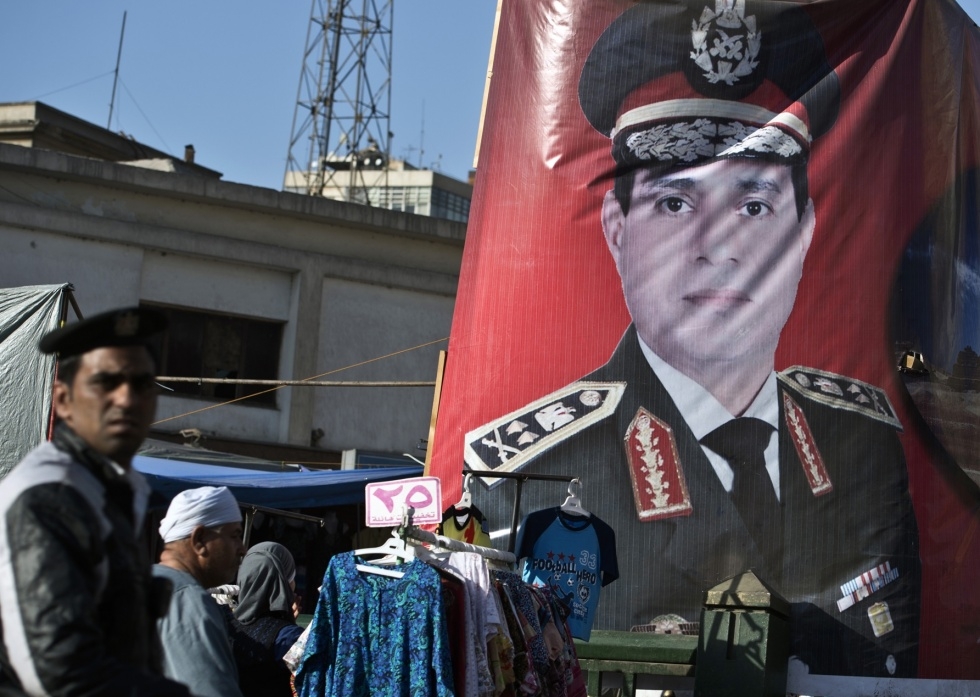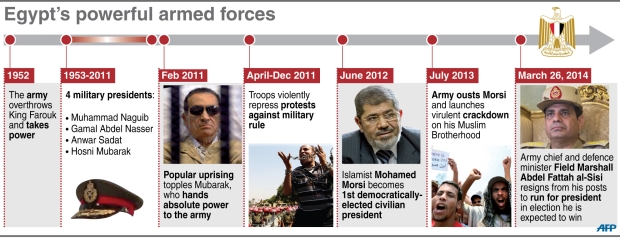With Morsi gone, Egypt vote turns into Sisi-Sabbahi contest

Egypt's presidential election has turned into a contest between the ex-army chief and a leftist who claims to represent the ideals of the 2011 uprising.
After deposing Mohamed Morsi, the country's first elected and civilian president in July, former army chief Abdel Fattah al-Sisi is now the frontrunner in the May 26-27 vote.
Sisi's sole rival is Hamdeen Sabbahi, who came third in the 2012 election which Morsi won.
Morsi's Muslim Brotherhood will not feature in the election. Not only is it boycotting the vote, but it has also been blacklisted as a "terrorist" organisation amid a brutal crackdown on the group by the military-installed authorities - despite sweeping all elections since Mubarak's fall.
The movement's top leaders are behind bars, and its members are blocked from contesting any poll.
Stay informed with MEE's newsletters
Sign up to get the latest alerts, insights and analysis, starting with Turkey Unpacked
Next month's vote comes against the backdrop of unprecedented violence set off by Morsi's overthrow.
Amnesty International says more than 1,400 people have died in the police crackdown targeting Morsi's supporters, while over 15,000 have been jailed.
The authorities say more than 500 people, mostly policemen and soldiers, have been killed in militant attacks since the overthrow of Morsi.
The insecurity has helped boost Sisi's popularity, with supporters seeing him as a leader capable of bringing stability. However, critics say violence and upheaval in the country is a direct result of the July 2013 coup.
Since a military coup in 1952, every president in Egypt has come from the military, except Morsi.
Sisi's plans unknown
As the economy falters, many are looking to Sisi to deliver the stability needed to reassure investors and tourists - the interim government currently in place came about as a result of the July coup.
Meanwhile, Sabbahi hopes to capitalise on fears that Sisi represents a return to the authoritarian era of Mubarak. An ongoing crackdown against the Muslim Brotherhood has also targeted some leading activists of the 2011 revolt.
"We are facing a clear situation: there is a candidate who could take us to the future and there is another who could take us to the past," said Amr Badr, Sabbahi's spokesman.
As Sabbahi officially submitted his candidacy on Saturday, a group of young people who form the backbone of his support base chanted "Justice comes before force" and "No need to be a marshal to be strong".
Sabbahi, who has won the backing of Al-Dostour, a liberal party founded by Nobel laureate and former head of the UN's nuclear watchdog Mohamed ElBaradei, gathered around 30,000 signatures backing his candidacy, an electoral commission official said.
That compares with almost 200,000 backing Sisi's campaign, the official added.
Despite the huge support, Sisi's positions on economic and political issues remain unclear, and there is little idea of how he would approach the job of president, said Michele Dunne of Carnegie Endowment for International Peace.
She said the interim government has been operating in "crisis mode" since Morsi's ouster.
"The big question is whether, once Sisi is president and the post-coup political road map is nearly completed, he will begin to take actions to cut through this knot of problems," Dunne said.
"So far there is no sign of a political or security strategy on Sisi's part to move beyond the crackdown in effect since July 2013."
Middle East Eye delivers independent and unrivalled coverage and analysis of the Middle East, North Africa and beyond. To learn more about republishing this content and the associated fees, please fill out this form. More about MEE can be found here.



